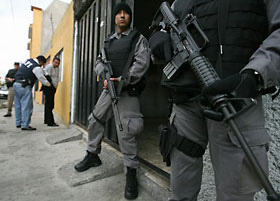 |
 |
 |
 Editorials | Issues | January 2007 Editorials | Issues | January 2007  
Mexico Drug Barons Get Warning
 Dane Schiller - Express-News Dane Schiller - Express-News


| | Federal policemen stand guard as member of the Federal Investigative Agency search a man for drugs during an anti-narcotics operation in the Iztapalapa district in Mexico City Wednesday. (Reuters) |
By deploying the army and sending top drug prisoners to the United States, President Felipe Calderón appears bent on showing the nation he's in charge and warning gangsters to end a bloody turf war.

The word to Mexico's criminal underworld: Crawl back under your rocks — and kill fewer people — or take major heat from the feds.

By a Mexican congressional estimate, as many as 2,100 people died in cartel violence last year — a dramatic increase from the past.

The bloodletting is a national security concern and a constant source of friction between the U.S. and Mexico.

The boldest executions involved severed heads tossed onto the dance floor of a nightclub and the machine-gunning of six police officers riding in a truck.

"We are absolutely determined, for our children, to recover our streets, parks and cities," Calderón said this week. "We are on our way."

It remains to be seen how long the new president will keep the pressure on, but observers say he's already acting bolder than his predecessor, Vicente Fox.

"He is sending a strong message that some things that were tolerated in the past will not be tolerated anymore," said Jorge Chabat, a Mexico criminal-justice system expert. "It is my guess (traffickers) will get the message and modify their behavior."

"Who is going to invest a dollar in Mexico if you see images of beheaded people on the front pages of newspapers?" he said. "You can not expect to be treated like a civilized country if you tolerate these manifestations of violence."

Chabat said no one expects Calderón's latest actions will put the cartels out of business or stop the drug flow, but they could re-establish some order.

The army was operating checkpoints in the industrial city of Monterrey on Friday, just days after several key drug traffickers, including Osiel Cárdenas, the head of the Gulf Cartel smuggling organization, were handed over to U.S. authorities.

Despite being imprisoned in Mexico, Cárdenas was believed to be following a long tradition of jailed capos using bribes and intimidation to run their syndicates from their cells.

A natural Cárdenas rival, Héctor Luis "El Guero" Palma, once head of the Sinaloa cartel, was also chained by masked federal agents and whisked aboard a U.S.-bound plane.

Calderón took a page from violence-torn Colombia's playbook by sending them to the United States, where if convicted they likely will spend the rest of their lives behind bars.

In Colombia, warring cartels united in an attempt to intimidate the government into stopping extraditions. Police, judges and other officials were murdered and a commercial airliner was bombed to kill a witness.

In the end, the government brought the cartels to their knees — a strategy that in some ways resulted in Mexican gangsters taking over the hemisphere's drug trade.

Chabat said sending Cárdenas and others to the United States likely will create power struggles and therefore more short-term violence within the cartels, but he doubted the gangs would take on Calderón.

"Traffickers know if they go to war against the Mexican government, they will have to face the United States, and that is not a wise decision," he said.

He also noted that Mexico's institutions, including its army, are more solid than their Colombian counterparts.

The military's presence, however, was unusual on the streets of Monterrey, where troops were checking vehicles this week. Motorists eased into lines of traffic that slowly filed by combat-ready soldiers.

There were no immediate reports of arrests or seizures.

The city, most known for its economic clout, has seen increasing drug violence, including shootings in upscale neighborhoods and the execution of a police commander.

Mike Vigil, former chief of international operations for the U.S. Drug Enforcement Administration, said Calderón had to take action.

"When drug trafficking gets so out of control, and you have all this violence generated as a result, it impacts the national security of a country," said Vigil, who was based in Colombia and Mexico.

By shipping traffickers to the United States, where they face federal charges, Calderón is stopping them from running their gangs and making it likely they will never again set foot in Mexico, Vigil said.

"They cannot be kings anymore and are basically severed from their organizations," he said. "All of a sudden, they go from being the head, to being nobody."

dschiller@express-news.net | 
 | |
 |



